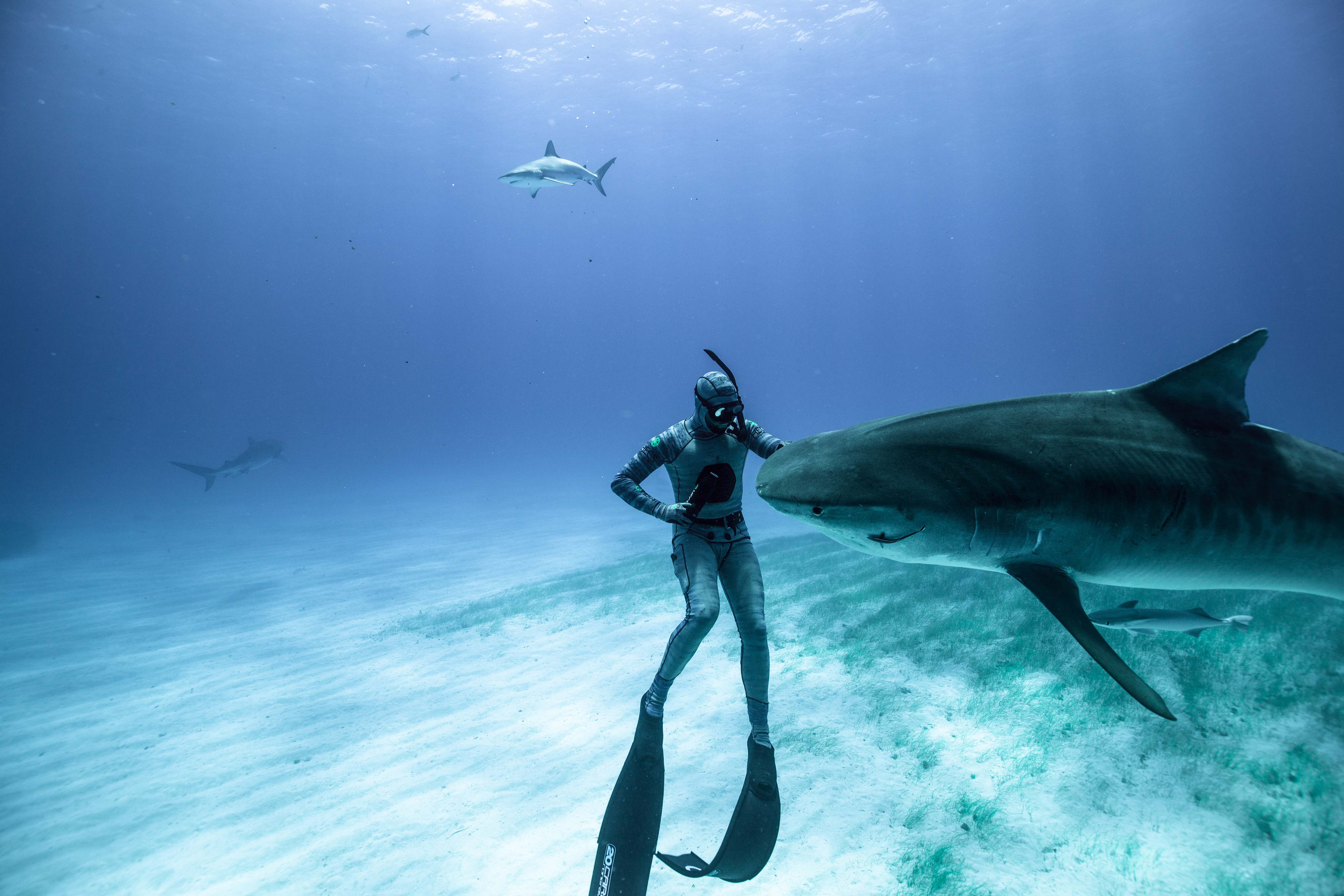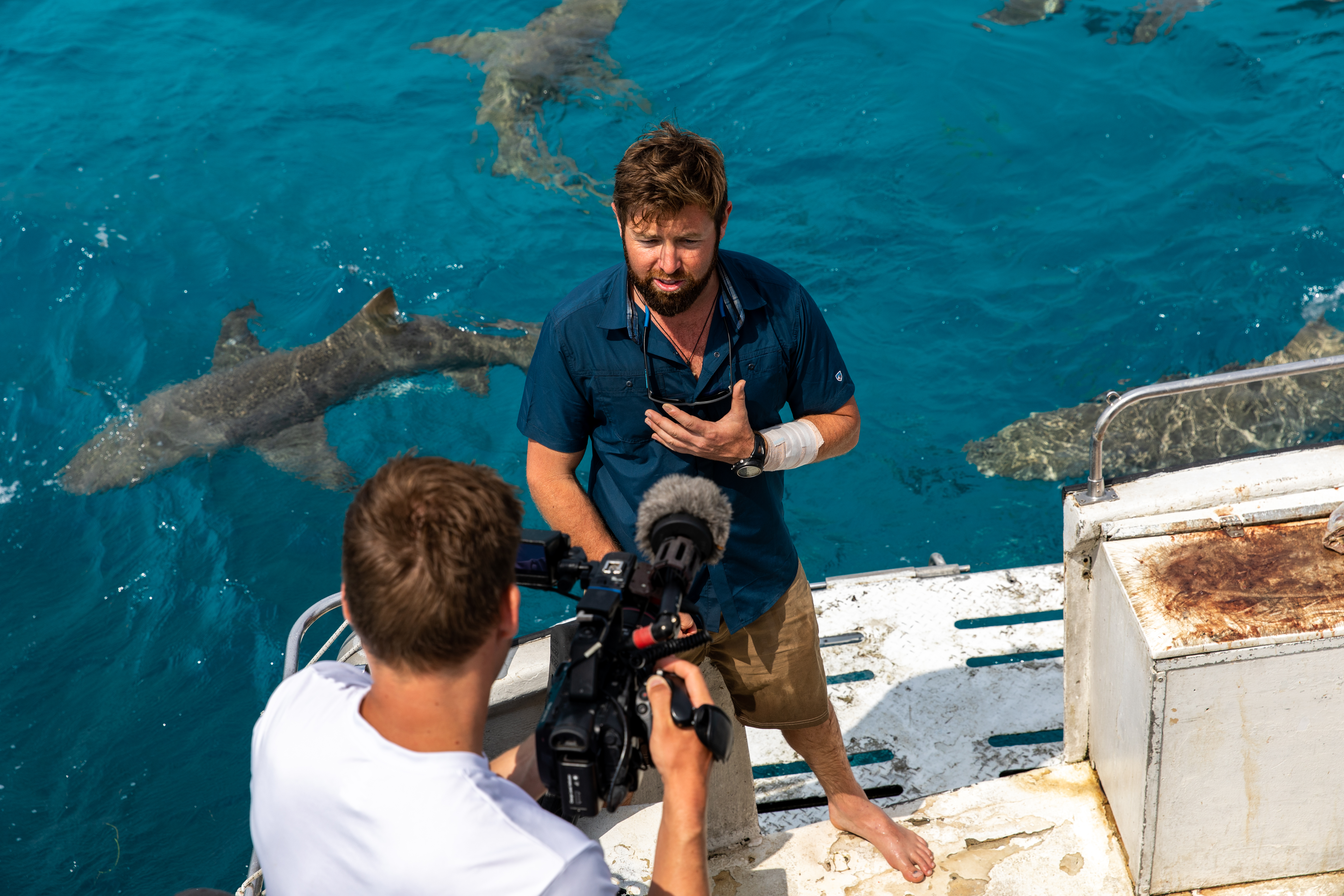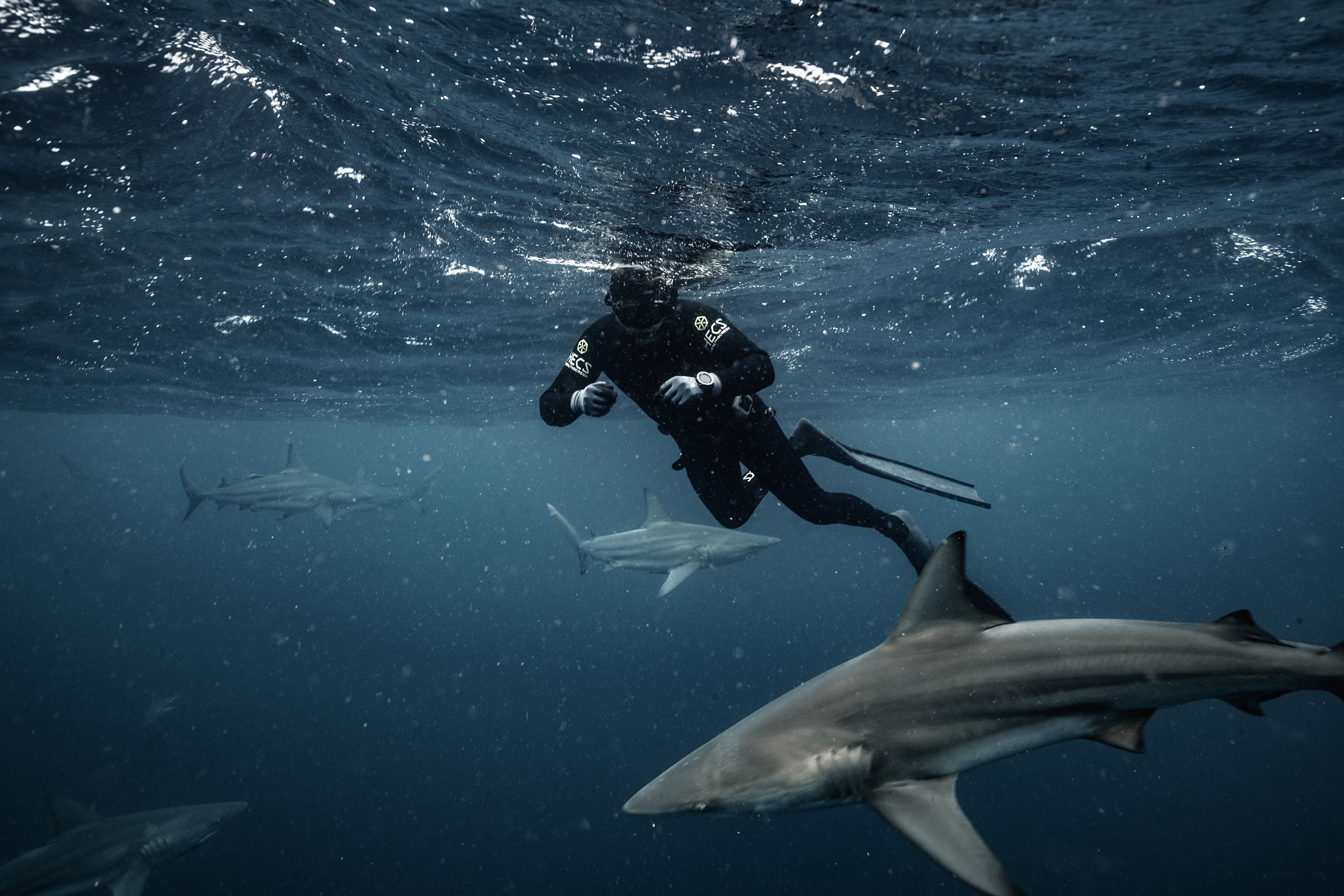
Forrest Galante is the wildlife biologist and conservationist the world needs right now. He’s engaging, he builds his conservation work on a solid foundation of science, and he truly loves all animals in a way that echoes Steve Irwin — gleefully swimming with sharks and gators. Galante is also an adventurer who spent his pre-COVID time globe-trotting around the world working in animal conservation while also trying to locate extinct species on his Animal Planet show Extinct or Alive.
To celebrate this year’s Shark Week, Galante teamed up with elasmobranchologist Dr. Dave Ebert to track three sharks off the coast of southern Africa — all thought to be extinct. The result, Extinct or Alive: Land of the Lost Sharks, is engaging, escapist TV that feels perfect for this moment in history. You get to travel with Galante to far-flung lands while also scoring great information about a group of fish that have suffered greatly at the hands of humans.
This week, we chatted with Galante over the phone about his new show. After talking about tracking sharks, we veered into the ever-changing world of animal conservation, hunting, and poaching in an unstable era. We had so much fun that we decided to drink a few drams of whisky with the man, t0o — check out last week’s UPROXX LIFE Expression Session below.
So before we get into the shows, let’s talk just a little bit about how you became a conservationist.
I grew up in Zimbabwe, which is a very wild place. But look, lots of people grew up in Zimbabwe and didn’t go on to be conservationists. In Zim, I was the son of farmers and safari business owners. So I spent my whole life in the bush and as I grew to become an adult, I decided that I love animals.
The way I like to describe it, Zach, remember when you were a kid and you flip something over like a log and you see an earthworm, right? And you’re like, “Oh my God, how cool is that?” Well, most people grow out of that. I did not. As I grew up, I wanted to know everything about that earthworm. I wanted to know what it ate, where it lived, what made it tick, what ate it, and so on. So as I got older, I turned my just plain love of wildlife, animals, and the sciences and went on to become an academic and got a degree in my passion to become a conservationist. I started as a biologist and realized my talents were really in communicating science far more so than academia. And so I began to communicate science on different platforms and ended up on television and been here ever since.
So, your new show, Land of the Lost Shark, is set in South Africa and Mozambique where you’re looking for lost sharks. How do you approach finding animals that are believed to be extinct?
I’ve made a niche in my world as being the guy that finds these animals — the animals that others can’t find. So in Land of the Lost Shark, I had the amazing privilege of teaming up with Dr. Dave Ebert, a world-renowned elasmobranchologist (AKA shark scientist) who’s named over 40 species of shark himself. He’s actually known as the “Lost Shark” guy. Dave and I are buddies. He’s awesome, man.
So, I reached out to Dave and I said, “Hey Dave, There’s a couple of regions in the world that are hotspots for lost sharks. One of them is my old backyard, southern Africa. Why don’t we go down there and work together and see if we can actually scratch up a couple of these things?” And Dave said, “Forrest, I’d love nothing more.” And so we took that to the network and said, “Hey, I know last year we found a lost shark in Sri Lanka, the Pondicherry, but this year, Dave and I — combining our expertise — him on a very academic level and mine on a more physical level — we think we might be able to be successful in finding even more than one lost species in these waters, off the coast of South Africa and Mozambique. What do you think?” And they’re like, “We love it. Good luck.”
So what makes your shark doc stand out?
The thing that’s different about is ours are much, much more of a scientific documentary. I think the headliner for sure — and don’t, I’m not trying to bash Shark Week — but I think the headliner for Shark Week is a Tyson versus Jaws. Things like “Swimming with Sharks,” you know?
Ours is rigorous scientific work with regards to trying to find these animals. We, in the course of an hour episode, there are around 14 different species of elasmobranchs, which is an incredible amount of animal diversity to have in a 44-minute episode of television.
That sounds fantastic. We’re both travelers. We’ve both been adventure travelers most of our lives. And for the first time in our adult lives, we’re living in a time when you can’t just jump on a plane and go. There’s a reality to that which has a pretty harsh pinch on conservation activities — you’re seeing poaching spike, etc.
How are you adjusting to not being able to travel, and thereby study and work?
What’s interesting is that I think people are taking polarizing opinions on what’s going on. And the reality is that there are both sides of the coin. What I mean by that is in some places we’re seeing great, great positive change. I assume at this point, everybody’s seen those stories of coyotes coming back into the cities and bears coming out of hiding. There’s a Malabar civet that was seen walking down the street in India. In some cases, with the shutdown and lock-in, animals are relaxing a little bit and they’re recovering in a sense. Even though it’s very short-term, where they’re able to come out of hiding and they’re able to reoccupy niches that have otherwise been occupied by human beings for as long as we can basically remember.
That’s been great for wildlife. It’s like giving it a breath of air. It’s like the pressure’s been taken off for a very, very short amount of time.
But then again…
On the flip side of that coin, the ugly truth has been rearing its head as well. With these government shutdowns, we’ve seen a spike in poaching efforts in certain places because if the government shuts down, the people that enforce anti-poaching and monitoring are also shut down and poachers are licking their lips going, “This is my opportunity.” So, in countries in southern Africa and in certain areas in Asia, we’ve seen a spike in poaching activity in rhinos, elephants, and big cats.
Then there’s the pangolin, well, this is insane to me because the pangolin is the species currently labeled responsible for the global pandemic. Yet that species has seen a massive spike in poaching during the pandemic because all of the people and enforcement that generally try and curb that have been shut down.
I mean, talk about a terrible turn of events. You’d think, if a pangolin gets labeled as responsible for a pandemic, maybe we’d stop consuming and killing them? But instead, the opposite has happened. It’s increased the demand, which is crazy.
I don’t want to be all doom and gloom but along with the global pandemic has come new — and I will use this term quite clearly here — bullshit remedies.

Can you give us an example of what you’d consider a bullshit animal remedy?
Bear bile is one. We’ve seen a huge increase in the mistreatment of bears and the poaching of bears for their bile. We’ve seen that increase in the demand simply because some bullshit Eastern medicine is saying bear bile can cure coronavirus. So now, all these bears are being culled and are living through terrible mistreatment for that bullshit.
So there are both sides of the coin. Some of it is good. Some of it’s sad. I think the pandemic has given people that work in wildlife a chance to see people’s true colors. Those that poach have seen an opportunity to poach further. Then there are those who have seen the silver lining, which is animals trying to recover.

I grew up understanding the link between hunting/fishing and conservation in the United States as it pays for it. And I understand how in some places in Africa tagged hunting pays for conservation as well. But it feels like that’s not enough anymore. That system was already on very shaky ground, to begin with — especially in southern Africa. So now that this pandemic has helped expose that, we have to ask, “Okay, well, what do we do next?”
That’s one of the most unfortunate things, Zach, is that there is no cure-all. Every species needs its own management, its own policies, and everything needs its own strategy. There’s no magic button.
I take that back. There is a magic button, right? There is one magic button and that is to cease all habitat destruction and hunting practices immediately. But there’s a very big difference between being an optimist and being a realist. And that “magic button” is unrealistic. There’s absolutely no way the entire world stops encroaching on wildlife habitat and taking wildlife. So without that being a possibility, and it’s not, the thing that makes wildlife sciences so difficult is that each animal, whether it’s an insect or a rhinoceros, needs its own management plan.
And those plans have to be constructed by scientists — like me and those far more skilled than myself — in order to implement those plans. They have to be studied and everything I’ve just listed requires time, money, and resources that, frankly, the world doesn’t have right now. So that’s a really tough question to answer. I mean, there is no immediate solution. Now, that being said, there are wonderful people and organizations that are fighting to combat all the negativity. Then what people can do is support those groups and organizations and causes.
What are you working on next and how difficult has it become to do your work?
We’re still working. Wildlife work never sleeps. Although we’re facing more challenges than ever with travel restrictions, my team and I are doing what we can to continue to fight the good fight. We have more projects coming up domestically. I can say that I certainly have more academic work currently than I do television work because that’s just the nature of the pandemic. Things are quiet and relatively on hold, but at the same time, we’re utilizing that.
We’re doing the best we can to spread awareness and share the message. I have some projects coming up on some news sites and sources around the world. Some of them are talking about the mistreatment of wildlife during COVID and things like that. And yeah, you just keep plugging away. I think it’s going to be a little bit more domestic for the foreseeable future than most of my work has been in the past, but so be it. Charity starts at home, so does wildlife work.

You can watch Forrest Galante on “Extinct or Alive: Land of the Lost Sharks” on the Discovery Channel on Tuesday, August 11th, at 8 pm EST. You can also follow Galante’s work on Twitter, Instagram, and Facebook.

 #extinctoralive Land of the Lost Sharks premiers at 8pm on @discovery during @sharkweek! This is an INCREDIBLE expedition where I team up with @lostsharkguy to attempt to locate 3 species of lost shark! It’s one of the most butt kicking, exciting and dangerous adventures I’ve ever been on and am so excited for everyone to see it!
#extinctoralive Land of the Lost Sharks premiers at 8pm on @discovery during @sharkweek! This is an INCREDIBLE expedition where I team up with @lostsharkguy to attempt to locate 3 species of lost shark! It’s one of the most butt kicking, exciting and dangerous adventures I’ve ever been on and am so excited for everyone to see it! 